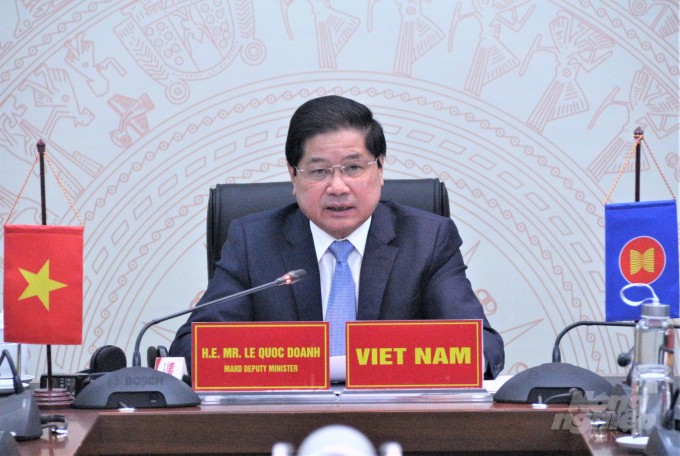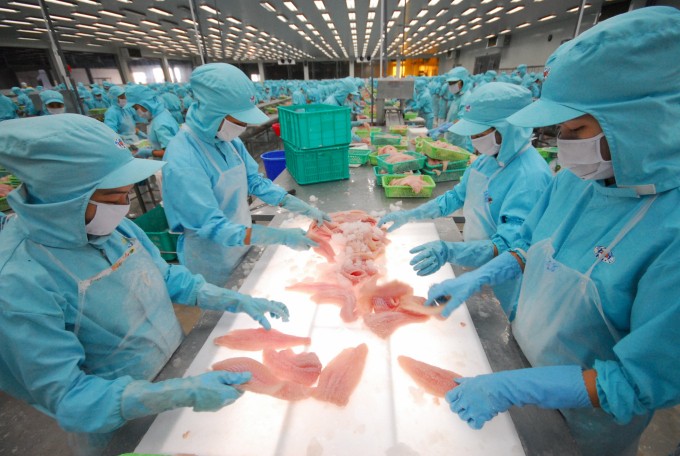- Giới thiệu
- Nhóm Công tác
- Tin tức
- Thông tin về FTA
- Tài Liệu
- Sự kiện
- Liên hệ
Restoring food supply in the post-Covid-19 period
On October 27, Deputy Minister Le Quoc Doanh represented Vietnam participating in ASEAN ministerial meetings on agriculture and forestry cooperation, including the 43rd ASEAN Ministerial Meeting on Agriculture and Forestry (AMAF 43).
Mr. Syahrul Yasin Limpo, Indonesia's Minister of Agriculture, presided over the virtual event, which also included ministers from other ASEAN member states.
At AMAF 43, representatives from ASEAN countries reached consensus on efforts to implement recovery measures to ensure an adequate and continuous food supply as well as the operation of businesses and services for the food system and agriculture

Deputy Minister Le Quoc Doanh represented Vietnam participating in ASEAN ministerial meetings on agriculture and forestry cooperation, including the 43rd ASEAN Ministerial Meeting on Agriculture and Forestry (AMAF 43) on October 27. Photo: Pham Hieu - Nongnghiep.vn
During the conference, participants expressed their appreciation for the ASEAN Secretariat's efforts to ensure sustainable growth in the ASEAN area via the food and agro-forestry sectors.
The Conference endorsed the ASEAN Guidelines for the promotion of digital technology use in the ASEAN food and agricultural sector.
For the ASEAN Strategy on Biomass Energy for Regional Agricultural and Rural Development Communities, the Conference encouraged all ASEAN partners and stakeholders to collaborate with ASEAN to develop and implement relevant Action Plans to contribute to rural communities' energy supply and security by generating modern biomass energy from organic waste management, agricultural by-products, and timber plantations.
Additionally, the conference endorsed proposals for the feasibility study of the ASEAN Common Fisheries Policy, emphasizing the full implementation of 12 Regional Fisheries Policy Frameworks, including marine litter. For the ASEAN Strategy on Biomass Energy for Regional Agricultural and Rural Development Communities for the period 2020-2030, the Conference encouraged all ASEAN partners and stakeholders to work with ASEAN to realize the implement relevant Action Plans to contribute to energy supply and energy security for rural communities by generating modern biomass energy through organic waste management by agricultural by-products and plantations for timber as fuel.
In addition, the meeting adopted recommendations for the ASEAN Common Fisheries Policy Feasibility Study focusing efforts on the full implementation of 12 Regional Fisheries Policy Frameworks including marine litter. .
Efforts to promote cross-sectoral collaboration on conservation agriculture, climate-smart agriculture, and sustainable land management activities were also highlighted in order to secure the regional sustainability of bio-agricultural systems

Deputy Minister Le Quoc Doanh, outlined five strategies for agriculture recovery and development in the new normal at the conference.
To begin, he proposes to strengthen intra-ASEAN cooperation and ASEAN cooperation with partners in order to connect food, agriculture, forestry, and fisheries supply chains, as well as to assist smallholder farmers and small, medium, and micro enterprises in overcoming the negative effects of Covid-19.
Second, supporting green agriculture development and resource conservation via innovation. Collaboration towards the establishment of transparent, accountable, and sustainable agricultural value chains.
Thirdly, supporting collaboration in data-driven agriculture, including digital transformation of management, by establishing policies and solutions for agricultural growth, such as forecasting, market warning, and management planning.
Forthly, encouraging all stakeholders in society, particularly companies and individuals, to respond and participate, and to further promote the role of public-private partnerships (PPPs) in service recovery and green development.
And the last, enhancing vulnerable groups' proactive adaptation ability in the face of shocks, while also assisting them in successfully using resources and improving business models in order to participate in the process of greening and sustainable agriculture.
Source: Nongnghiep.vn
Tin liên quan
Agriculture and Environment exhibition ready for National celebration2025/08/27
Vietnam to transfer 1 million tons of carbon credit the World Bank2025/08/29
China surpass the U.S. to become Vietnam's largest market for cashew nuts2025/08/25
Enhancing adaptive climate change monitoring in agriculture and the environment2025/08/21
ICD to affirm Vietnam's voice in global agriculture and environment forums2025/08/01



 Điều lệ hoạt động
Điều lệ hoạt động



















































